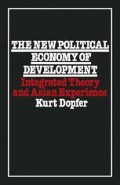Abstract
The classical and neoclassical theories constitute the intellectual backbone of the ‘forced’ strategies. Economists adhering to this impressively consistent body of hypotheses may object to the imputation that their theory has normative implications. At least, the choice of the theory as a strategic device would be considered to be strictly independent from the theory which is understood as being descriptive-explanatory. Such response would faithfully accord with the old tradition (which was brought to a climax in the ‘new welfare economics’) that economics has to describe what is and not to prescribe what should be. By no means is the economist qua economist in a position to make value judgements or to draw policy inferences from his descriptive-explanatory insight. Besides the evident fact that this itself implies a value judgement, the view suggests an ‘objective’ science. It may suffice in the context of this study to stress that the classical and neoclassical theories, once stated, are not without normative implications. By propounding, first, that the body of the classical and neoclassical hypotheses explains European history, and, second, that this experience may be telescoped in Asia, the original descriptive-explanatory theory has normative implications. Clearly, if development is desirable, and the corresponding expectations rely on the blueprint of Western experience, the proposition that a repetition of Western experience is feasible along the lines propounded by classical and neoclassical theory can hardly fail to have strong bearings on policy-making.
Access this chapter
Tax calculation will be finalised at checkout
Purchases are for personal use only
Preview
Unable to display preview. Download preview PDF.
Notes
For classical contributions see, in particular, W. A. Lewis, ‘Economic Development with Unlimited Supplies of Labour’, in The Manchester School, vol. 22, May 1954, reprinted in A. N. Agarwala and S. P. Singh (eds), The Economics of Underdevelopment (London: Oxford University Press, 1971), pp. 400–49;
Gustav Ranis and John C. H. Fei, ‘A Theory of Economic Development’, in American Economic Review: Papers and Proceedings, Sept. 1961, reprinted in Theodore Morgan and George W. Betz (eds.), Economic Development; (Belmont: Wadsworth, 1970) pp. 89–98; Gustav Ranis and John C. H. Fei, ‘Agrarianism, Dualism, and Economic Development’ in Irma Adelman and Eric Thorbecke (eds.), The Theory and Design of Economic Development, op. cit. pp. 3–43. For neoclassical contributions see, for instance, Dale W. Jorgenson, ‘Testing Alternative Theories of the Development of a Dual Economy’, ibid., pp. 45–60; id, ‘The Role of Agriculture in Economic Development: Classical versus Neoclassical Models of Growth’, in Clifton R. Wharton, Jr. (ed.), Subsistence Agriculture and Economic Development (Chicago: Aldine, 1970), pp. 320–48.
See, particularly, Albert O. Hirschman, The Strategy of Economic Development (New Haven, Conn.: Yale University Press, 1958).
The theory of pressure as stimulants of development has also been applied to the agricultural sector; for instance, Ester Boserup, The Conditions of Agricultural Growth: The Economics of Agrarian Change Under Population Pressure (London: Allen & Unwin, 1965);
and Yujiro Hayami and Vernon W. Ruttan, Agricultural Development: An International Perspective (Baltimore: Johns Hopkins University Press, 1971), pp. 61–3.
John Maynard Keynes, Economic Consequences of the Peace (1918) pp. 16–17,
quoted in Joan Robinson, Economics, An Awkward Corner (London: Allen & Unwin, 1973) p. 12.
See Alexander Gerschenkron, Economic Backwardness in Historical Perspective (Cambridge, Mass.: Harvard University Press, 1962) p. 16 ff.
See David S. Landes, ‘Japan and Europe: Contrasts in Industrialisation’, in William W. Lockwood (ed), The State and the Economic Enterprise in Japan (Princeton University Press, 1965) pp. 100 if.
Arthur J. Taylor, Laissez-faire and State Intervention in Nineteenth-century Britain (London: Macmillan, 1972), pp. 60–4.
For a discussion on the British ‘individualistic approach’ see L. J. Zimmerman, Poor Lands, Rich lands: the widening Gap (New York: Random House, 1965) pp. 108–20.
A. Vaidyanathan, Some Aspects of Inequalities in Living Standards in Rural India (New Delhi: Planning Commission, 1971) p. 36 ff. Dandekar and Rath’s survey supports, by and large, the above findings. They report that 10 per cent of India’s rural poor have stayed where they were at the beginning of the 1960s, while the 10 per cent of the urban poor have definitely suffered; see V. M. Dandekar and N. Rath, ‘Poverty in India: Dimensions and Trends’, Economic and Political Weekly, vol. 6, 1971, pp. 39 and 40.
Copyright information
© 1979 K. Dopfer
About this chapter
Cite this chapter
Dopfer, K. (1979). In the Theoretical Mainstream. In: The New Political Economy of Development. Palgrave Macmillan, London. https://doi.org/10.1007/978-1-349-04784-0_15
Download citation
DOI: https://doi.org/10.1007/978-1-349-04784-0_15
Publisher Name: Palgrave Macmillan, London
Print ISBN: 978-1-349-04786-4
Online ISBN: 978-1-349-04784-0
eBook Packages: Palgrave Political & Intern. Studies CollectionPolitical Science and International Studies (R0)

